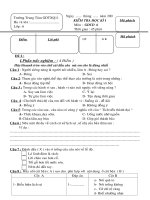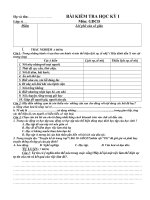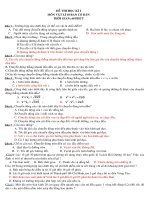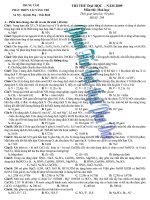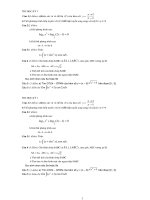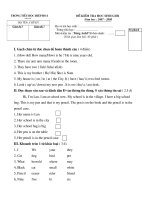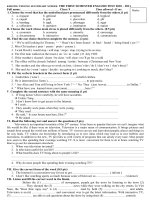de thi thptqg chuan
Bạn đang xem bản rút gọn của tài liệu. Xem và tải ngay bản đầy đủ của tài liệu tại đây (101.82 KB, 6 trang )
<span class='text_page_counter'>(1)</span>PRACTICE TEST NO. 11 – EXU 1 - 1617 Student’s full name:....................................................................... Tài liệu của: Mark the word whose underlined part differs from the other three in pronunciation 1: A. confine B. conceal C. convention D. concentrate Cô Bích 2. A. four B. journey C. pour D. your Mark the the word that differs from the other three in the position of primary stress 3: A. sociable B. vacancy C. opponent D. habitat 4: A. discourage B. document C. general D. politics Mark the underlined part that needs correction in each of the following questions. 5: Pollution makes streams, lakes and coastal water (A) unpleasant (B) to look at, to smell, and to swim in. Fish and shellfish harvested from (C) polluted waters may be unsafe to eat (D). 6: A finishing (A) motion picture (B) is the work (C) of the collaboration of many individuals (D). 7: Educational films are made for (A) schools, training films for industry; documentary films present (B) fact events (C) or circumstances of social, political, or historical nature (D). Mark the the correct answer to each of the following questions. 8: On attaining maximum size, ______ by drawing itself out and dividing into two daughter amoebas, each receiving identical nuclear materials. A. the reproduction of the amoeba B. the amoeba, which reproduces C. reproducing the amoeba D. the amoeba reproduces 9: I suggest the room ………………..before Christmas. A. be decorated B. is decorated C. were decorated D. should decorate 10: She should ___________ in the garage when we came around, which would explain why she didn't hear the bell. A. work B. be working C. have worked D. have been working 11: James Cook,______ , also discovered tje Hawaiian Islands. A. by exploring the South Sea he reached Australia. B. explored the South Sea and reaching Australia. C. who explored the South Sea and reached Australia. D. explored the South Sea then reached Australia. 12: When friends insist on ______ expensive gifts, it makes most people uncomfortable. A. them to accept B. they accepting C. their accepting D. they accept 13: There are several means of mass communication. The newspaper is one. Television is ______. A. another B. Other C. the another D. the other. 14. In my _______ to win a place at university, I am now under a lot of study pressure. A. improvement B. support C. confidence D. attempt 15: ____ the exception ____ the little baby, everybody in my family has to jog every morning. A. With / to B. With / of C. In / of D. By / of 16. “ Wild-life-preserves “ are areas where wild animals are _______ within their natural environment. A. hunted B .threatened C. protected D. discarded . 17: An addict can go to any ……..to obtain his drug. A. cases B. lengths C. chances D. places 18. Language is not necessarily the private ________ of those who use it . A . instruction B. property C . importance D. guidance . 19. An important part of conservation is the _________ of waste . A . preservation B. prevention C. production D. pollution . Mark the most suitable response to complete each of the following exchanges. 20: Minh : " My first English test was not as good as I expected " Thomas : " _________." A. Good Heavens! B. Never mind , better job next time! C. That's brilliant enough! D. It's okay . Don't worry. 21:Tom : “This medicine tastes horrible! ” Mary : “________, it will cure your cough. ” A. Be that as it may. B. Come what may C. How much horrible is it D. Whatever it tastes Mark the word(s) CLOSEST in meaning to the underlined word(s) in each of the following questions. 22: The removal of cataracts in the eyes by laser has become a common procedure. A. method B. belief C. improvement D. regulations 23: Mayo Hospital in New Orleans was so named in recognition of Dr. Mayo’s outstanding humanitarianism. A. exhaustive B. Charitable C. remarkable D. widespread Choose the word/phrase that is OPPOSITE in meaning to the underlined part in the following questions 24: After all these years of good work, Arthur deserves a promotion. A. ought to be denied B. might be produced C. should be given D. could be rejected 25: 25: At times, I look at him and wonder what is going on in his mind. A. sometimes B. always C. hardly D. never Mark the sentence that is closest in meaning to each of the following questions. 26. At this time tomorrow, hopefully, I'll be relaxing at home rather than working this hard. A. Resting at home is something I hope to be doing at this time tomorrow, but I'll probably be working quite hard instead. B. Tomorrow, rather than relaxing at home as I'd hoped to do, I'll be working quite hard. C. I'm planning to relax at home tomorrow, instead of working so hard. D. I hope that, instead of working so hard at this time tomorrow, I'll be at home resting. 27. Public education is so good in European countries that there is almost no demand for private schools. A. Even the excellence of public education in Europe does not stop people from sending their children to private schools..
<span class='text_page_counter'>(2)</span> B. People still send their children to private schools in Europe although the public education system is excellent. C. Hardly anyone sends their children to private schools in Europe because state schools are excellent. D. In Europe, there is no reason for parents to send their children to private schools because state schools are so good. 28. The number of people participating in the conference was far below my expectation. A. I had expected that many more people would actually attend the conference. B. I think attendance at the conference was low because it was held too far away from the city centre. C. I knew that holding such a conference required the participation of more people. D. The number of participants at the conference far exceeded my expectations. Mark the sentence that best combines each pair of sentences in the following questions. 29. When there is so much traffic on the roads, it is sometimes quicker to walk than to go by car. A. During rush hours, walking gives me much more pleasure than driving in the heavy traffic. B. The traffic is so heavy that you’d better walk to work; it’s quicker. C. There is so much traffic these days that it is more pleasant to walk than to drive. D. It is faster to walk than to drive in the heavy traffic at certain time of the day. 30. When we arrived at the party after our car broke down on the way there, there weren't many people left. A. Our car broke down on the way to the party and by the time we got there, most of the guests had already left. B. Because we had car trouble on the way to the party, many people grew tired of waiting and left before we arrived there. C. Not many people had left the party yet when we got there, although we were late because of a car problem on the way. D. When we arrived at the party after we had had car trouble on the way there, hardly anyone had left yet. Read the following passage and mark the correct word or phrase that best fits each of the blanks In “Cerealizing America”, Scott Bruce and Bill Crawford remark that the cereal industry uses 816 million pounds of sugar per year. Americans buy 2.7 billion packages of breakfast cereal each year. If ( 31)___ end to end, the empty cereal boxes from one year’s consumption would (32) ___ to the moon and back. One point three (1.3) million advertisements for cereal are broadcast on American television every year at a cost of $762 million for airtime. Only automobile manufacturers spend more money on television advertising than the makers of breakfast cereal. Most of the boxed cereals found in supermarkets contain large amounts of sugar and some contain more than 50% sugar. Cereal manufacturers are very clever in their marketing, making many cereals appear much healthier than they really are by “fortifying” them with vitamins and minerals. Oh, lovely - you now have vitamin-fortified sugar! Before you eat any cereal, read the ingredient list and see how (33) ___ sugar appears on the ingredient list. Then check the “Nutrition facts” panel. There are actually only a small handful of national commercially-branded cereals that are made (34) ___ whole grains and are sugar-free. If you shop at a health food store instead of your local supermarket, you ( 35) ___ to find a healthy, whole grain, sugar-free (or very low sugar) cereal. But watch out! Some of the health food store boxed cereals are sweetened with fruit juice or fructose. Although this may be an improvement on refined white sugar, this can really skyrocket the calories. From “Foods That Burn Fat, Foods That Turn to Fat” by Tom Ventulo 31: A. to lay B. laying C. lay D. laid 32: A. reach B. prolong C. stretch D. contact 33: A. tall B. large C. high D. many 34: A. by B. from C. at D. in 35: A. are more likelier B. are much more likely C. would be able D. could more or less Read the following passage and mark the correct answer to each of the questions One of the most important social developments that helped to make possible a shift in thinking about the role of public education was the effect of the baby boom of the 1950's and 1960's on the schools. In the 1920's, but especially in the Depression conditions of the 1930's, the United States experienced a declining birth rate – every thousand women aged fifteen to forty-four gave birth to about 118 live children in 1920, 89.2 in 1930, 75.8 in 1936, and 80 in 1940. With the growing prosperity brought on by the Second World War and the economic boom that followed it, young people married and established households earlier and began to raise larger families than had their predecessors during the Depression. Birth rates rose to 102 per thousand in 1946, 106.2 in 1950, and 118 in 1955. Although economics was probably the most important determinant, it is not the only explanation for the baby boom. The increased value placed on the idea of the family also helps to explain this rise in birth rates. The baby boomers began streaming into the first grade by the mid-1940's and became a flood by 1950. The public school system suddenly found itself overtaxed. While the number of schoolchildren rose because of wartime and postwar conditions, these same conditions made the schools even less prepared to cope with the flood. The wartime economy meant that few new schools were built between 1940 and 1945. Moreover, during the war and in the boom times that followed large numbers of teachers left their profession for better-paying jobs elsewhere in the economy. Therefore, in the 1950's and 1960's, the baby boom hit an antiquated and inadequate school system. Consequently, the "custodial rhetoric" of the 1930's and early 1940's no longer made sense; that is, keeping youths aged sixteen and older out of the labor market by keeping them in school could no longer be a high priority for an institution unable to find space and staff to teach younger children aged five to sixteen. With the baby boom, the focus of educators and of laymen interested in education inevitably turned toward the lower grades and back to basic academic skills and discipline. The system no longer had much interest in offering nontraditional, new, and extra services to older youths. 36: What does the passage mainly discuss? A. The teaching profession during the baby boom B. Birth rates in the United States in the 1930's and 1940 C. The impact of the baby boom on public education D. The role of the family in the 1950's and 1960's 37: The word "it" in line 11 refers to____. A. 1950 B. economics C. the baby boom D. value 38: The public school of the 1950's and 1960's faced all of the following problems EXCEPT A. a declining number of students C. a shortage of teachers B. old-fashioned facilities D. an inadequate number of school buildings 39: According to the passage, why did teachers leave the teaching profession after the outbreak of the war?.
<span class='text_page_counter'>(3)</span> A. They needed to be retrained. B. They were dissatisfied with the curriculum. C. Other jobs provided higher salaries. D. Teaching positions were scarce. 40: The word "inadequate" is closest in meaning to____. A. deficient B. expanded C. innovative D. specialized 41: The "custodial rhetoric" refers to____. A. raising a family C. running an orderly house hold B. keeping older individuals in school D. maintaining discipline in the classroom 42: Which of the following best characterizes the organization of the passage? A. The second paragraph presents the effect of circumstances described in the first paragraph. B. The second paragraph provides a fictional account to illustrate a problem presented in the first paragraph. C. The second paragraph argues against a point made in the first paragraph. D. The second paragraph introduces a problem not mentioned in the first paragraph. Read the following passage and mark the correct answer to each of the questions As the twentieth century began, the importance of formal education in the United States increased. The frontier had mostly disappeared and by 1910 most Americans lived in towns and cities. Industrialization and the bureaucratization of economic life combined with a new emphasis upon credentials and expertise to make schooling increasingly important for economic and social mobility. Increasingly, too, schools were viewed as the most important means of integrating immigrants into American society. The arrival of a great wave of southern and eastern European immigrants at the turn of the century coincided with and contributed to an enormous expansion of formal schooling. By 1920 schooling to age fourteen or beyond was compulsory in most states, and the school year was greatly lengthened. Kindergartens, vacation schools, extracurricular activities, and vocational education and counseling extended the influence of public schools over the lives of students, many of whom in the larger industrial cities were the children of immigrants. Classes for adult immigrants were sponsored by public schools, corporations, unions, churches, settlement houses, and other agencies. Reformers early in the twentieth century suggested that education programs should suit the needs of specific populations. Immigrant women were once such population. Schools tried to educate young women so they could occupy productive places in the urban industrial economy, and one place many educators considered appropriate for women was the home. Although looking after the house and family was familiar to immigrant women, American education gave homemaking a new definition. In preindustrial economies, homemaking had meant the production as well as the consumption of goods, and it commonly included income-producing activities both inside and outside the home, in the highly industrialized early-twentieth-century United States, however, overproduction rather than scarcity was becoming a problem. Thus, the ideal American homemaker was viewed as a consumer rather than a producer. Schools trained women to be consumer homemakers cooking, shopping, decorating, and caring for children "efficiently" in their own homes, or if economic necessity demanded, as employees in the homes of others. Subsequent reforms have made these notions seem quite out-of-date. 43: The paragraph preceding the passage probably discusses _____. A. the industrialization and the bureaucratization of economic life the United States in the nineteen century. B. the formal schooling in the United States in the nineteen century. C. the urbanization in the United States in the nineteen century. D. the most important means of integrating immigrants into American society in the nineteen century. 44: It can be inferred from paragraph 1 that one important factor in the increasing importance of education in the United States was _____. A. the expanding economic problems of schools B. the growing number of schools in frontier communities C. an increase in the number of trained teachers D. the increased urbanization of the entire country 45: The phrase "coincided with" in line 7 is closest in meaning to _____. A. happened at the same time as B. ensured the success of C. was influenced by D. began to grow rapidly 46: According to the passage, one important change in United States education by the 1920's was that _____. A. the amount of time spent on formal education was limited B. new regulations were imposed on nontraditional education C. adults and children studied in the same classes D. most places required children to attend school 47: “Vacation schools and extracurricular activities” are mentioned in line 9 to illustrate _____. A. activities that competed to attract new immigrants to their programs. B. alternatives to formal education provided by public schools C. the importance of educational changes D. the increased impact of public schools on students 48: According to the passage, early-twentieth century education reformers believed that _____. A. special programs should be set up in frontier communities to modernize them B. corporations and other organizations damaged educational progress C. different groups needed different kinds of education D. more women should be involved in education and industry 49: The word "it" in line 19 refers to _____. A. education B. consumption C. production D. homemaking 50: Women were trained to be consumer homemakers as a result of _____. A. scarcity in the highly industrialized early-twentieth-century United States B. economic necessity in the highly industrialized early-twentieth-century United States C. income-producing activities in the highly industrialized early-twentieth-century United States D. overproduction in the highly industrialized early-twentieth-century United States. PRACTICE TEST NO. 12 – EXU 1 - 1617.
<span class='text_page_counter'>(4)</span> Student’s full name:....................................................................... Tài liệu của: Mark the word whose underlined part differs from the other three in pronunciation Cô Bích – 0948 180 911 16/4 Cù Chính Lan 1. A. fool B. bamboo C. food D. flood 2. 2. A. worked B. laughed C. hoped D. naked Mark the the word that differs from the other three in the position of primary stress 3: A. Innocent B. nevertheless C. contents D. supermarket 4. A. consignation B. abnormality C. supplementary D. confidence Mark the letter A, B, C, or D on your answer sheet to indicate the underlined part that needs correction in each of the following questions. 5: There are (A) vast, open grazing lands, (B) an area that receives (C) little rain than the farming region (D) west of the Missouri River. 6: Although the Indians (A) lacked animals they (B) had the ability to cultivate (C) plants suitably for (D) daily use. 7: (A) Not long after Galileo’s time, Sir Isaac Newton invented (B) another kind of telescope (C) which he used mirrors (D) instead of lenses. Mark the the correct answer to each of the following questions. 8 . ______, many animals can still survive and thrive there. A. Even though the weather conditions in the desert severe B. The weather conditions in the desert to be severe C. Although the weather conditions in the desert are severe D. Being severe weather conditions in the desert 9. It is critical that you ____ anything the night before your surgery. A. not eat B. do not eat C. did not eat D. ate 10: There’s a lot more to Willie than one would think: still waters run _____ A.deep B. deeply C. deepness D. depth 11: Why ____ Peter to the party? He is always making trouble A.Don’t we invite B. don’t you invite C. not invite D. invite 12: You are under no obligation _____ to accept this offer A. whatsoever B. Eventually C. Apart D. indeed 13: ______ no money would be wasted, we will use energy more efficiently A.so that B. in order that C in order to D. A and B 14. Somebody who is foolish or stupid is ____. A. soft in the head B. over the moon C. riding high D. pushing up daisies 15: There should be an international law encouraging_____ A.afforestation B. deforestation C. forestry D. reforestation 16: I’m not keen on _____ control of the project to a relatively newcomer A.undertaking B. charging C. entrusting D. allotting 17: Everyone in our class _____ his suggestion. A. agrees to B. agree with C. agree to D. agrees with 18. What will happen to his ............ ? A. horse racing B. horse race C. racing horse D. race horse 19. The company fell deeper and deeper into the ____ and then went bankrupt. A. black B. green C. yellow D. red Mark the letter A, B, C, or D on your answer sheet to indicate the most suitable response to complete each of the following exchanges. 20."Is that a new coat?" "Yes, what _____ it?” A. are you thinking of B. do you think of C. is your idea about D. did you think about 21. “Why don’t you go to the zoo?” – “____________ .” A. That’s a good idea. B. Because we don’t have enough money. C. I couldn’t agree more. D. Yes, I’d love to. Mark the word(s) CLOSEST in meaning to the underlined word(s) in each of the following questions. 22: Earthquakes are regarded as one of the most devastating forces known to man. A. terrifying B. destrutive C. fasnating D. mysterious 23: S. Mayo Hospital in New Orleans was so named in recognition of Dr. Mayo’s outstanding humanitarianism. A. exhaustive B. producing C. spreading D.collecting Choose the word/phrase that is OPPOSITE in meaning to the underlined part in the following questions 24: His creer advancement was slow and he did not gain any promotion until he was 40, when he won the position of the company’s Chief Excutive. A.Progress B. elevation C. rise D. decrease 25: After five days on trial, the court found him innocent of the crime and he was released. A. benevolent B. innovative C. naive D. guilty Mark the sentence that is closest in meaning to each of the following questions. 26. It isn't just that the level of education of this school is high. It's that it's also been consistent for years. A. The level of education in this school, which is usually quite high, shows only slight variations from year to year. B. The standard of education is not high in this school, but at least all the students are at the same level. C. Not only are the standards of education good in this school, but it has maintained those standards over the years. D. It isn't fair to deny that this school is successful, as it has had the same high standards for many years now. 27. The President offered his congratulations to the players when they won the cup. A The President congratulated that the players had won the cup. B. When they won the cup, the players had been offered some congratulations from the President..
<span class='text_page_counter'>(5)</span> C. The President would offer the players congratulations if they won the match. D. The President congratulated the players on their winning the match. 28. I remember giving you a five-pound note. A. Whether I gave you a five-pound note or not, I can remember. B. I can't remember whether I gave you a five-pound note or not. C. I did gave you a five-pound note, and I could remember it. D. I remember I have given you a five-pound note. Mark the sentence that best combines each pair of sentences in the following questions. 29. My sister worries so much about fitness that she wastes a lot of ti1me and money. A. My sister wastes a lot of time and money though she worries so much about fitness. B. My sister worries about fitness so that she wastes a lot of time and money. C. Worrying too much about fitness, my sister wastes a lot of time and money. D. Fitness worried, my sister wasted a lot of time and money. 30. Considering that we travelled right across the country, the bus ticket was surprisingly reasonable. A. Because we were able to move right through the country, the price of the bus ticket didn't bother us. B. The ticket for the bus, which took us from one side of the country to the other, was the cheapest that we could find. C. The most reasonable way to go right across the country was by bus, so we bought ourselves a ticket. D. As the bus brought us right across the country, we found the price of the ticket to be cheaper than its value to us. Read the following passage and mark the correct word or phrase that best fits each of the blanks Oxford is a city with such a mind- blowing reputation that many who come here find themselves intimidated by the place and can’t wait to leave. While others, taking to it like a ____(31)to water. Find themselves return again and again, the college lawns provide a gorgeous backdrop to serious study, and in the light night, on a sunny winter’s morning says, one feels as if one is ____(32) on air, such is the sense of unreality. Oxford may like to pretend that it is at the intellectual hub of things but in many ways , it is no more than a sleepy backwater where to mix metaphors, transitory students, the cream their generation, wait in the wings allowing their talents to ____(33) before moving off into the industrial or political fast-lane. Much of this is a myth, of course. Hardship and hard work are very much part and parcel of student life .The ____(34) get through the three years’ hard grind by simply putting their shoulders to the ____(35) before going on to fairly average jobs. Only for the tiny minority is Oxford the first step on the ladder to fame and future. 31. A. fish B. duck C. boat D. swimmer 32. A. flying B. gliding C. floating D. swimming 33. A. flourish B. open C. spread D. float 34. A. level- headed B. hot- headed C. hot- blooded D. kind-hearted 35. A. cart B. wheel C. engine D. boat Read the following passage and mark the correct answer to each of the questions The Winterthur Museum is a collection and a house. There are many museums devoted to the decorative arts and many house museums, but rarely in the United States is a great collection displayed in a great country house. Passing through successive generations of a single family, Winterthur has been a private estate for more than a century. Even after the extensive renovations made to it between 1929 and 1931, the house remained a family residence. This fact is of importance to the atmosphere and effect of the museum. The impression of a lived-in house is apparent to the visitor: the rooms look as if they were vacated only a short while ago whether by the original owners of the furniture or the most recent residents of the house can be a matter of personal interpretation. Winterthur remains, then, a house in which a collection of furniture and architectural elements has been assembled. Like an English country house, it is an organic structure; the house, as well as the collection and manner of displaying it to the visitor, has changed over the years. The changes have coincided with developing concepts of the American arts, increased knowledge on the part of collectors and students, and a progression toward the achievement of a historical effect in period-room displays. The rooms at Winterthur have followed this current, yet still retained the character of a private house. The concept of a period room as a display technique has developed gradually over the years in an effort to present works of art in a context that would show them to greater effect and would give them more meaning for the viewer. Comparable to the habitat group in a natural history museum, the period room represents the decorative arts in a lively and interesting manner and provides an opportunity to assemble objects related by style, date, or place of manufacture. 36: What does the passage mainly discuss? A. Historical furniture contained in Winterthur B. How Winterthur compares to English country houses C. Elements that make Winterthur an unusual museum D. The reason that Winterthur was redesigned 37: The phrase "devoted to" in line 1 is closest in meaning to ________ . A. specializing in B. sentimental about C. surrounded by D. successful in 38: What happened at Winterthur between 1929 and 1931? A. The old furniture was replaced B. The estate became a museum C. The owners moved out D. The house was repaired 39: What does the author mean by stating "the impression of a lived-in house is apparent to the visitor"? A. Few people visit Winterthur B. The furniture at Winterthur looks comfortable C. Winterthur does not look like a typical museum D. Winterthur is very old 40: The word "it" refers to _________ . 1.
<span class='text_page_counter'>(6)</span> A. collection B. English country house C. visitor D. Winterthur 41: According to the passage, objects in a period room are related by all of the following EXCEPT _________ . A. place of manufacture B. date C. past ownership D. style 42: What is the relationship between the two paragraphs in the passage? A. Paragraph 2 explains a philosophy of art appreciation that contrasts with that explained in Paragraph 1. B. Paragraph 2 explains a term that was mentioned in Paragraph 1. C. Each paragraph describes a different historical period D. Each paragraph describes a different approach to the display of objects in a museum Read the following passage and mark the correct answer to each of the questions Very few people, groups, or governments oppose globalization in its entirety. Instead, critics of globalization believe aspects of the way globalization operates should be changed. The debate over globalization is about what the best rules are for governing the global economy so that its advantages can grow while its problems can be solved. On one side of this debate are those who stress the benefits of removing barriers to international trade and investment, allowing capital to be allocated more efficiently and giving consumers greater freedom of choice. With free-market globalization, investment funds can move unimpeded from the rich countries to the developing countries. Consumers can benefit from cheaper products because reduced taxes make goods produced at low cost from faraway places cheaper to buy. Producers of goods gain by selling to a wider market. More competition keeps sellers on their toes and allows ideas and new technology to spread and benefit others. On the other side of the debate are critics who see neo-liberal policies as producing greater poverty, inequality, social conflict, cultural destruction, and environmental damage. They say that the most developed nations – the United States, Germany, and Japan – succeeded not because of free trade but because of protectionism and subsidies. They argue that the more recently successful economies of South Korea, Taiwan, and China all had strong state-led development strategies that did not follow neo-liberalism. These critics think that government encouragement of “infant industries” – that is, industries that are just beginning to develop – enables a country to become internationally competitive. Furthermore, those who criticize the Washington Consensus suggest that the inflow and outflow of money from speculative investors must be limited to prevent bubbles. These bubbles are characterized by the rapid inflow of foreign funds that bid up domestic stock markets and property values. When the economy cannot sustain such expectation, the bubbles burst as investors panic and pull their money out of the country. Protests by what is called the anti-globalization movement are seldom directed against globalization itself but rather against abuses that harm the rights of workers and the environment. The question raised by nongovernmental organizations and protesters at WTO and IMF gatherings is whether globalization will result in a rise of living standards or a race to the bottom as competition takes the form of lowering living standards and undermining environmental regulations. One of the key problems of the 21 st century will be determining to what extent markets should be regulated to promote fair competition, honest dealing, and fair distribution of public goods on a global scale. From “Globalization” by Tabb, William K., Microsoft ® Student 2009 [DVD]. 43: It is stated in the passage that ______. A. the protests of globalization are directed against globalization itself B. the United States, Germany, and Japan succeeded in helping infant industries C. suppoters of globalization stress the benefits of removing trade barriers D. critics of globalization say that the successful economies are all in Asia 44: Supporters of free-market globalization point out that ______. A. consumers can benefit from cheaper products B.there will be less competition among producers C. taxes that are paid on goods will be increased D. investment will be allocated only to rich countries 45: The word “allocated” in the passage mostly means “_____”. A. removed B. solved C. offered D. distributed 46: The phrase “keeps sellers on their toes” in the passage mostly means “_____”. A. makes sellers responsive to any changes B. allows sellers to stand on their own feet C. forces sellers to go bare-footed D. prevents sellers from selling new products 47: According to critics of globalization, several developed countries have become rich because of ____. A. their neo-liberal policies B. their help to developing countries C. their prevention of bubbles D. their protectionism and subsidies 48: Which of the following is NOT mentioned in the passage? A. Critics believe the way globalization operates should be changed. B. The anti-globalization movement was set up to end globalization. C. Some Asian countries had strong state-led economic strategies. D. Hardly anyone disapproves of globalization in its entirety. 49: The debate over globalization is about how_____. A. to use neo-liberal policies for the benefit of the rich countries C. to spread ideas and strategies for globalization B. to govern the global economy for the benefit of the community D. to terminate globalization in its entirely 50: The author seems to be _____ globalization that helps promote economy and raise living standards globally. A. supportive of B. indifferent to C. pessimistic about D. opposed to *** the end ***.
<span class='text_page_counter'>(7)</span>

